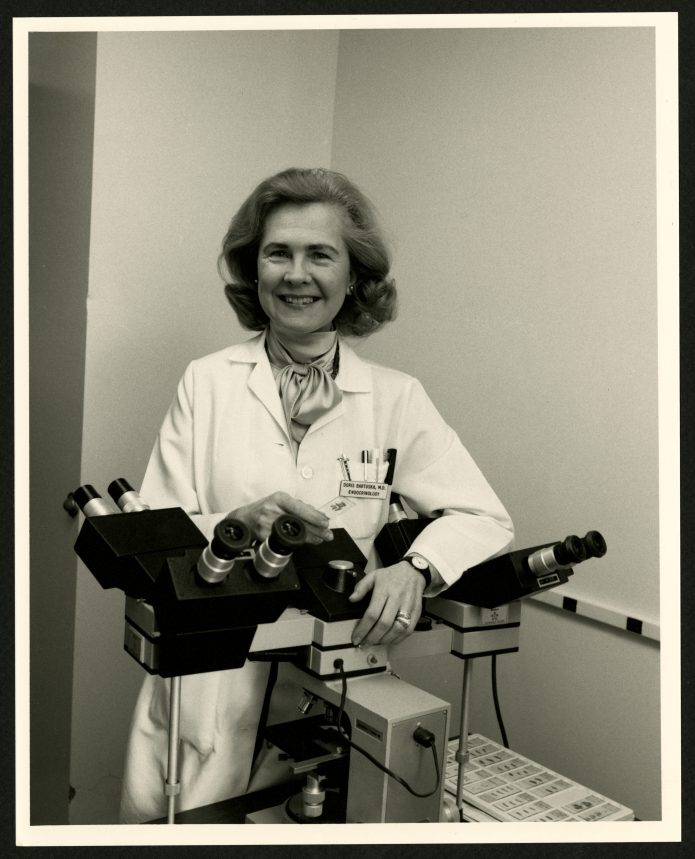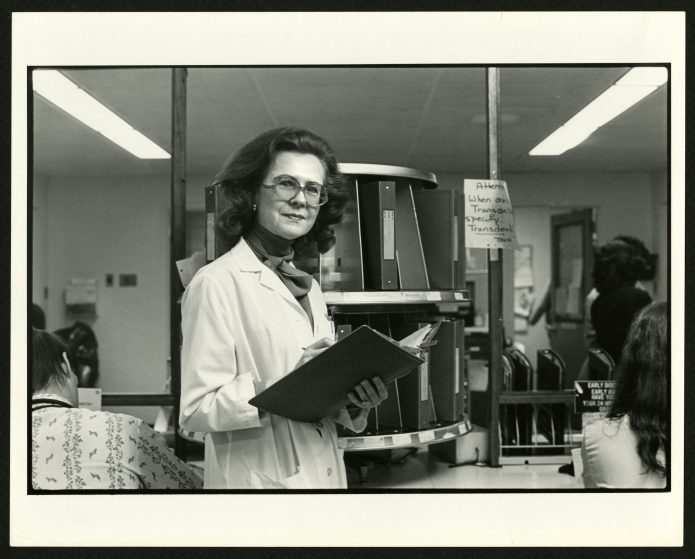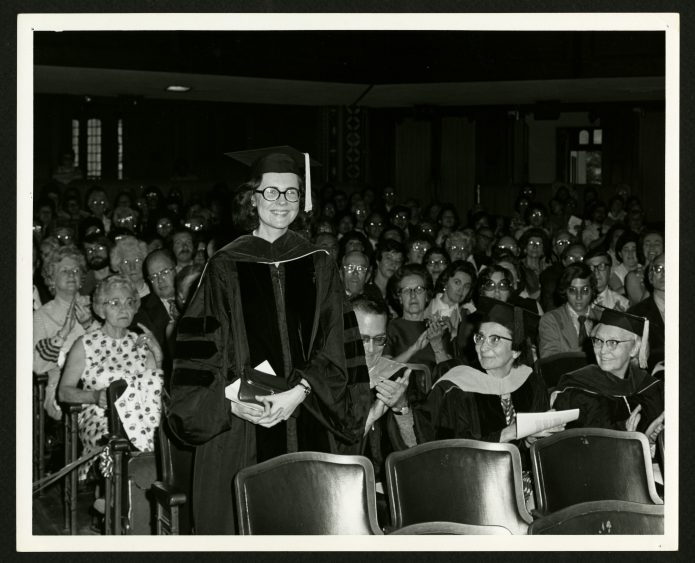The Story of Dr. Doris Bartuska: Sexism in Medicine during the 1950s to 1980s
-By Sabrina Kistler, Intern

Doris Bartuska, MD circa 1987.
As the granddaughter to a strong and influential woman physician, I never fully realized the fight women physicians underwent, and still face today, to bring society to a place of acceptance and equality for women in medicine. My grandmother, Dr. Doris Bartuska, worked throughout her career in endocrinology to best serve her patients, students, and ambitions, while dealing with sexism during the 1950s, 60s, 70s, and 80s. As a woman born in a small town, Nanticoke, Pennsylvania, she graduated with her medical degree from Woman’s Medical College of Pennsylvania in 1954 where she subsequently completed her internship and residency. She joined the WMC faculty in 1958 where she served as an Associate Dean for Curriculum, President of the Medical Staff, member of the Board of Directors, and President of the Alumni Association. In addition, Dr. Bartuska was the Director of the Division of Endocrinology, Diabetes, & Metabolism while also serving as the Director of the Endocrine Fellowship Training Program. Dr. Bartuska also believed in the importance of organized medicine, as shown by her roles as President of the American Medical Women’s Association, Delegate to the American Medical Association, President of the Philadelphia Medical Society, and many more. Throughout her career as a physician, teacher, and leader, she has helped pave the way for female physicians in the world today through her struggles against sexism in the medical community.

Doris Bartuska, MD during rounds circa 1983.
While medicine has since made long strides in accepting women into its community, that wasn't the case 50 years ago. During her medical school interviews, Dr. Bartuska was asked questions such as “do you plan on getting married?” and “are you going to have children?” questions not remotely related to one’s qualifications to become a doctor. While these questions may have seemed harmless, their answers could have drastic impact on whether you would be accepted or denied into their school. Even when she attended Woman’s Med, an all female medical school, Dr. Bartuska still noticed the discrimination of women from pregnant medical students being picked on to female faculty members receiving lower wages and lacking support from male faculty chairs. Dr. Bartuska faced additional adversity during her fellowship at Thomas Jefferson in Philadelphia, an all male medical school at the time, where she was called mommy Bartuska by her male peers. Eventually through her skill with consultations, she was able prove her worth and loose the nickname, but the lack of respect and acceptance she faced at the beginning would never be forgotten.

Doris Bartuska, MD receiving the Lindback Award for Distinguished Teaching circa 1974.
Even throughout her professional career in organized medicine, Dr. Bartuska underwent many setbacks due to her gender. During her campaign for President of the Pennsylvania Medical Society, she was the target of a smear campaign due to the fact that she was a women. Her fellow male colleagues would call saying they heard negative things about her, most likely of a sexual nature, eventually causing her to drop out of the race. While this attack could have been based on other factors besides her gender, if she had been elected she would have been the first female president of the Pennsylvania Medical Society, suggesting her gender was at least partly the cause for this attack. Dr. Bartuska also frequently found her name being presumptuously changed to Boris Bartuska, a male name, showing that women were still not traditionally considered to be physicians even in the 70s. Whether through mail or the introduction for her American Medical Association speech, this male name followed her throughout her career. While announcing her has Boris Bartuska during her AMA delegation speech may have been surprising and reflective of the adversity she still had yet to face, it worked out in her favor and eventually got her elected as a delegate to the AMA. Through her time with the AMA, she had worked with her fellow female delegates to increase the number of full time female delegates and to establish and grow the original Women's Caucus, now the Women Physicians Section.
While a smart and capable physician, Dr. Bartuska faced a lot of adversity throughout her life as a doctor. During her time in the 1950s, 60s, 70s, and 80s, she experienced sexism towards women in both the professional and medical community. Although her experiences may not have been as severe as others that came before her, it is evident that women still faced many struggles only a short time ago. It is clear there is still work to be done for having women fully represented and equalized in the medical and professional world but it is through women like my grandmother that have lead us closer to the finish line for equality.
Dr. Doris Bartuska’s archive collection can be found at The Legacy Center at Drexel College of Medicine’s Queen Lane Campus. Please use the following links for more information on her collection and transcripts for her two oral histories completed in 1977 and 2003.
Doris Bartuska Papers Finding Aid
Interview with Doris Bartuska, M.D., April 4 & 5, 1977
Oral History Interview with Doris Bartuska, M.D., May 15, 2003
If you would like to research any of these topics or items, please contact archives@drexelmed.edu